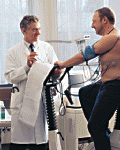“Pfizer’s reputation
as one of the world’s
premier marketers of
cardiovascular drugs made
it the natural choice as
our sales and marketing
partner for Lipitor.”
Anthony Wild, Ph.D.,
President,
Warner-Lambert
Pharmaceutical Sector |
Health Care – Pharmaceuticals (cont'd)Cardiovascular Diseases
Two silent cardiovascular conditions—high blood pressure and high cholesterol—each threaten about one American adult in every five. Both diseases are significantly underdiagnosed and undertreated. Pfizer now markets the leading products for both medical conditions.
 During 1997, Pfizer’s Norvasc became the world’s largest-selling antihypertensive medicine. Worldwide sales grew 23 percent to $2.2 billion. Norvasc’s success has come, in large part, from its once-daily dosing; its consistent, around-the-clock control of blood pressure and angina; and its excellent toleration, including a smooth onset, long duration of action, and steady blood levels. During 1997, Pfizer’s Norvasc became the world’s largest-selling antihypertensive medicine. Worldwide sales grew 23 percent to $2.2 billion. Norvasc’s success has come, in large part, from its once-daily dosing; its consistent, around-the-clock control of blood pressure and angina; and its excellent toleration, including a smooth onset, long duration of action, and steady blood levels.
 The PRAISE study found that Norvasc, in contrast to all other calcium channel blockers, is safe for use in the most severely ill congestive heart failure (CHF) patients. Norvasc, therefore, can be safely used to treat angina or hypertension in patients who also have CHF. The PRAISE study also found that in patients whose CHF was attributable to causes other than ischemia (impaired blood flow to the heart), the use of Norvasc significantly reduced the rate of death and illness. A new study involving nonischemic CHF patients, PRAISE II, has been undertaken to confirm these efficacy results in preparation for a potential U.S. regulatory filing for use of Norvasc in treating nonischemic CHF. Norvasc’s U.S. patent protection extends until March 2007. The PRAISE study found that Norvasc, in contrast to all other calcium channel blockers, is safe for use in the most severely ill congestive heart failure (CHF) patients. Norvasc, therefore, can be safely used to treat angina or hypertension in patients who also have CHF. The PRAISE study also found that in patients whose CHF was attributable to causes other than ischemia (impaired blood flow to the heart), the use of Norvasc significantly reduced the rate of death and illness. A new study involving nonischemic CHF patients, PRAISE II, has been undertaken to confirm these efficacy results in preparation for a potential U.S. regulatory filing for use of Norvasc in treating nonischemic CHF. Norvasc’s U.S. patent protection extends until March 2007.
 Sales of Procardia XL declined 18 percent to $822 million during the year, reflecting the product’s maturity and the medical community’s increasing emphasis on Norvasc. Nonetheless, Procardia XL was the third-largest-selling antihypertensive medicine in the United States. Nifedipine in the GITS delivery system, the Procardia XL formulation, is patent protected through September 2003. Sales of Procardia XL declined 18 percent to $822 million during the year, reflecting the product’s maturity and the medical community’s increasing emphasis on Norvasc. Nonetheless, Procardia XL was the third-largest-selling antihypertensive medicine in the United States. Nifedipine in the GITS delivery system, the Procardia XL formulation, is patent protected through September 2003.
 Cardura showed continued strong growth in 1997, with sales totalling $626 million. An alpha blocker, Cardura is indicated for both hypertension and BPH. It has been shown to be effective therapy for hypertensive patients with elevated blood lipid levels. It is particularly useful as add-on therapy in patients whose blood pressure is not controlled by a single agent. The product has a U.S. patent expiration in October 2000. A new product, Cardura XL, which uses the same GITS delivery system as Procardia XL and Glucotrol XL, has been approved in Germany for hypertension and filed more broadly in Europe and other international markets for the treatment of hypertension and BPH. Cardura showed continued strong growth in 1997, with sales totalling $626 million. An alpha blocker, Cardura is indicated for both hypertension and BPH. It has been shown to be effective therapy for hypertensive patients with elevated blood lipid levels. It is particularly useful as add-on therapy in patients whose blood pressure is not controlled by a single agent. The product has a U.S. patent expiration in October 2000. A new product, Cardura XL, which uses the same GITS delivery system as Procardia XL and Glucotrol XL, has been approved in Germany for hypertension and filed more broadly in Europe and other international markets for the treatment of hypertension and BPH.
 Lipitor was discovered and developed by the Parke-Davis Research Division of Warner-Lambert Company as an adjunct to diet and exercise in lowering elevated lipid levels in patients with high cholesterol. Pfizer copromotes or comarkets Lipitor with Parke-Davis in the United States, the United Kingdom, Germany, Italy, Canada, and other major world markets. Lipitor provides patients and doctors with a significant new option—a therapy that in clinical studies in patients with high cholesterol has demonstrated the ability to reduce LDL-cholesterol levels by 39 to 60 percent and to lower triglycerides by 19 to 37 percent, across its dosage range. Lipitor was discovered and developed by the Parke-Davis Research Division of Warner-Lambert Company as an adjunct to diet and exercise in lowering elevated lipid levels in patients with high cholesterol. Pfizer copromotes or comarkets Lipitor with Parke-Davis in the United States, the United Kingdom, Germany, Italy, Canada, and other major world markets. Lipitor provides patients and doctors with a significant new option—a therapy that in clinical studies in patients with high cholesterol has demonstrated the ability to reduce LDL-cholesterol levels by 39 to 60 percent and to lower triglycerides by 19 to 37 percent, across its dosage range.
 In the fourth quarter of 1997, U.S. monthly new prescriptions for Lipitor exceeded that of every other available lipid-lowering agent. Total 1997 sales worldwide, which were primarily recorded by Warner-Lambert, exceeded $800 million. Pfizer records its revenue from Lipitor as Alliance Revenue. In the fourth quarter of 1997, U.S. monthly new prescriptions for Lipitor exceeded that of every other available lipid-lowering agent. Total 1997 sales worldwide, which were primarily recorded by Warner-Lambert, exceeded $800 million. Pfizer records its revenue from Lipitor as Alliance Revenue.
 Pfizer expects to add to its cardiovascular product portfolio with regulatory filings in early 1998 for dofetilide, a new treatment for atrial fibrillation (AF). More than 10 million patients worldwide suffer from AF. Because AF can lead to the formation and vascular dissemination of blood clots, patients with AF run a fivefold increased risk of stroke. Symptoms of AF include chronic fatigue, palpitations, anxiety, shortness of breath, and poor exercise tolerance. Treatment costs for AF in the United States alone amount to nearly $8 billion. Pfizer expects to add to its cardiovascular product portfolio with regulatory filings in early 1998 for dofetilide, a new treatment for atrial fibrillation (AF). More than 10 million patients worldwide suffer from AF. Because AF can lead to the formation and vascular dissemination of blood clots, patients with AF run a fivefold increased risk of stroke. Symptoms of AF include chronic fatigue, palpitations, anxiety, shortness of breath, and poor exercise tolerance. Treatment costs for AF in the United States alone amount to nearly $8 billion.
 Dofetilide is the first medicine that specifically targets AF. It blocks the outflow of potassium in one, and only one, ion channel in the heart, thereby delaying the heart’s refractory period and reducing the opportunity for arrhythmias. In a large, well-controlled U.S. clinical trial, two thirds of atrial fibrillation patients maintained on treatment with dofetilide remained in normal cardiac rhythm for a full year compared with only one quarter of patients treated with placebo. As a result, the product relieves the debilitating symptoms of AF and improves patients’ overall quality of life. Because of its exquisite selectivity, dofetilide does not affect heart rate or depress cardiac pump function, and it possesses a very good overall toleration profile. Dofetilide is the first medicine that specifically targets AF. It blocks the outflow of potassium in one, and only one, ion channel in the heart, thereby delaying the heart’s refractory period and reducing the opportunity for arrhythmias. In a large, well-controlled U.S. clinical trial, two thirds of atrial fibrillation patients maintained on treatment with dofetilide remained in normal cardiac rhythm for a full year compared with only one quarter of patients treated with placebo. As a result, the product relieves the debilitating symptoms of AF and improves patients’ overall quality of life. Because of its exquisite selectivity, dofetilide does not affect heart rate or depress cardiac pump function, and it possesses a very good overall toleration profile.
|




